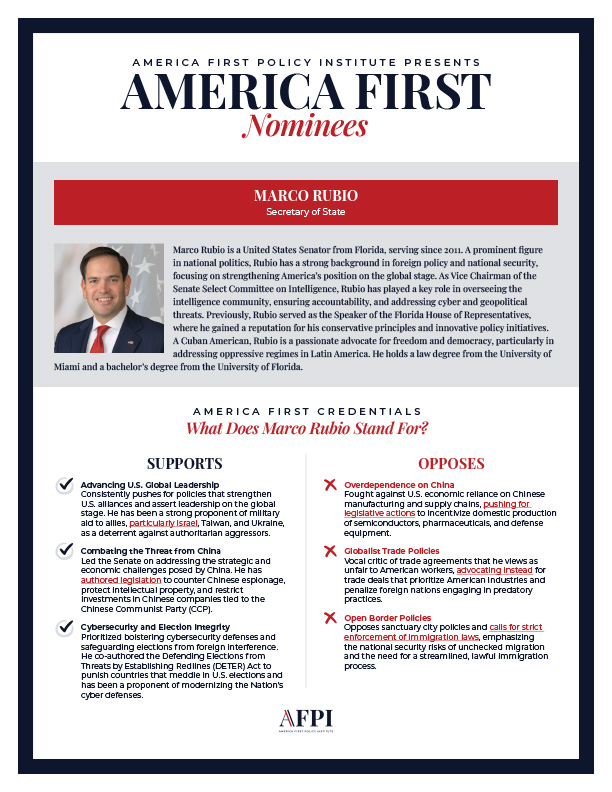America First Nomination: Marco Rubio
Biography
Marco Rubio is a United States Senator from Florida, serving since 2011. A prominent figure in national politics, Rubio has a strong background in foreign policy and national security, focusing on strengthening America’s position on the global stage. As Vice Chairman of the Senate Select Committee on Intelligence, Rubio has played a key role in overseeing the intelligence community, ensuring accountability, and addressing cyber and geopolitical threats. Previously, Rubio served as the Speaker of the Florida House of Representatives, where he gained a reputation for his conservative principles and innovative policy initiatives. A Cuban American, Rubio is a passionate advocate for freedom and democracy, particularly in addressing oppressive regimes in Latin America. He holds a law degree from the University of Miami and a bachelor’s degree from the University of Florida.
America First Credentials
Supports
Advancing U.S. Global Leadership:
Consistently pushes for policies that strengthen U.S. alliances and assert leadership on the global stage. He has been a strong proponent of military aid to allies, particularly Israel, Taiwan, and Ukraine, as a deterrent against authoritarian aggressors.
Combating the Threat from China:
Led the Senate on addressing the strategic and economic challenges posed by China. He has authored legislation to counter Chinese espionage, protect intellectual property, and restrict investments in Chinese companies tied to the Chinese Communist Party (CCP).
Cybersecurity and Election Integrity:
Prioritized bolstering cybersecurity defenses and safeguarding elections from foreign interference. He co-authored the Defending Elections from Threats by Establishing Redlines (DETER) Act to punish countries that meddle in U.S. elections and has been a proponent of modernizing the Nation’s cyber defenses.
Strengthening Immigration Policies:
Supports strong border security, including increased funding for border technology, physical barriers, and personnel. He is also an advocate for merit-based immigration reforms that prioritize national economic needs and ensure adherence to the rule of law.
Rebuilding American Manufacturing and Job Creation:
Led efforts to bring critical industries back to American soil, introducing the American Innovation and Manufacturing Act, which fosters domestic production and reduces reliance on foreign nations like China. He supports tax incentives for businesses that create manufacturing jobs in the United States.
Opposes
Overdependence on China:
Fought against U.S. economic reliance on Chinese manufacturing and supply chains, pushing for legislative actions to incentivize domestic production of semiconductors, pharmaceuticals, and defense equipment.
Globalist Trade Policies:
Vocal critic of trade agreements that he views as unfair to American workers, advocating instead for trade deals that prioritize American industries and penalize foreign nations engaging in predatory practices.
Open Border Policies:
Opposes sanctuary city policies and calls for strict enforcement of immigration laws, emphasizing the national security risks of unchecked migration and the need for a streamlined, lawful immigration process.
Bureaucratic Overreach in Regulation:
Pushed back against overregulation that stifles small businesses and entrepreneurship, proposing reforms to make the government more efficient and less intrusive.
Authoritarianism and Oppression:
Supports policies to sanction authoritarian regimes, including the CCP, Cuba, Venezuela, and Iran, that commit human rights abuses while providing aid to freedom movements in oppressed nations.
America First Achievements
Countering the China Threat:
- Co-authored the Uyghur Forced Labor Prevention Act, which bans imports from China’s Xinjiang region unless companies can prove goods were not made with forced labor. This legislation is a direct challenge to the CCP’s human rights abuses and protects American markets from exploitative practices.
- Authored legislation to strengthen scrutiny of Chinese investments in critical U.S. industries through the Committee on Foreign Investment in the United States, ensuring national security risks are mitigated.
Revitalizing Domestic Manufacturing:
- Played a critical role in passing the CHIPS and Science Act, which allocated $280 billion to bolster U.S. semiconductor manufacturing, reducing dependence on China and securing the supply chain for critical technology.
- Introduced the American Innovation and Manufacturing Act, which provides preferential and patient capital to America’s small manufacturers, further supporting domestic industries.
Strengthening Cybersecurity and Election Integrity:
- Introduced the DETER) Act, which imposes sanctions on foreign nations that interfere in U.S. elections.
- Supported funding to modernize the Cybersecurity and Infrastructure Security Agency, ensuring the U.S. is better prepared to defend against cyberattacks from adversaries like Russia and China.
Promoting Energy Independence:
Introduced the Preempting Misguided Appeasement and Financing of Destabilizing Regimes Act to reduce reliance on foreign energy sources and lower energy costs for American families.
Advocacy for Freedom and Democracy:
- Played a central role in shaping U.S. policy on Venezuela, including drafting sanctions against Nicolás Maduro’s regime and supporting the recognition of Juan Guaidó as Venezuela’s legitimate leader.
- Authored the Fighting Oppression until the Reign of Castro Ends Act, which prevents President Joe Biden or Secretary Antony Blinken from removing Cuba from the State Sponsor of Terrorism List and includes provisions about Cuba releasing political prisoners.
Advancing U.S. Military Strength:
Championed increased funding for the U.S. military, including pay raises for service members and investments in modernizing defense capabilities such as hypersonic weapons and advanced missile defense systems.
